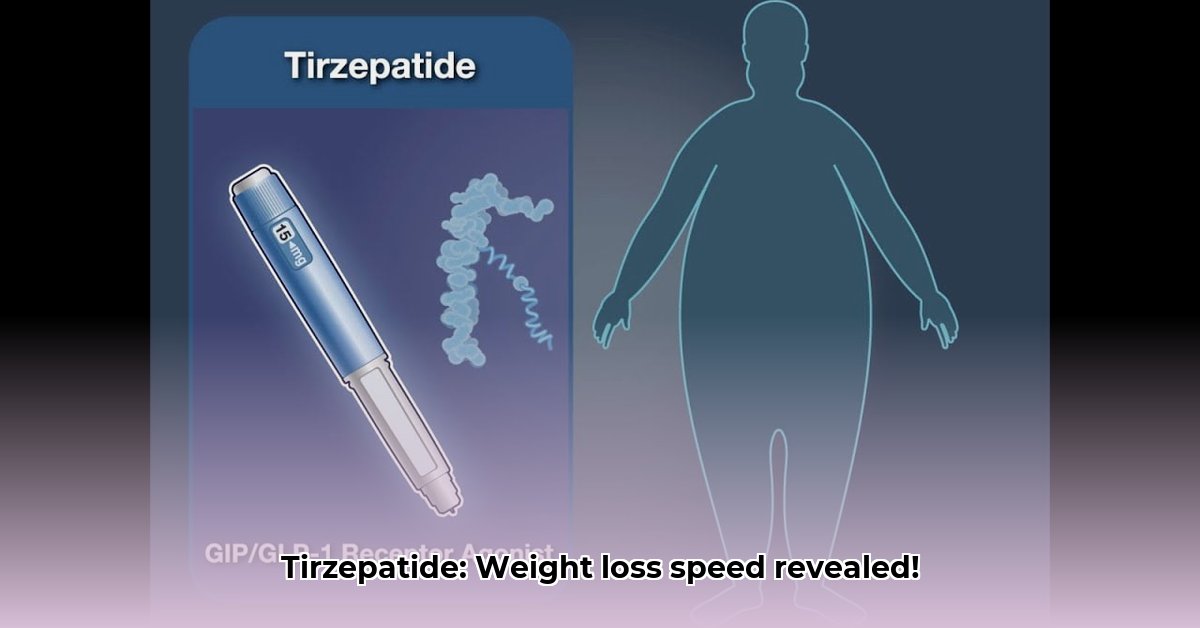
How Fast Does Tirzepatide Work for Weight Loss?
Tirzepatide (also known as Mounjaro or Zepbound) is a medication showing significant promise for weight loss. But how quickly can you expect to see results? This article examines data from clinical trials, exploring the timeline of weight loss and factors influencing individual responses. We'll also discuss potential side effects and provide actionable advice for maximizing its effectiveness.
The Weight-Loss Timeline: What Studies Show
Clinical trials have demonstrated that tirzepatide leads to substantial weight loss compared to a placebo. The degree of weight loss generally correlates with the dosage administered. One major study tracked weight loss at various time points:
| Dose (mg) | 16 Weeks (Average Weight Loss %) | 32 Weeks (Average Weight Loss %) | 72 Weeks (Average Weight Loss %) |
|---|---|---|---|
| 5 | 8% | 11% | 15% |
| 10 | 12% | 16% | 19.5% |
| 15 | 15% | 18% | 20.9% |
| Placebo | 2% | 3% | 3% |
Important Note: These are average results. Individual experiences vary significantly. The study was funded by the manufacturer, so potential biases must be considered. Further independent research is needed to confirm these findings.
Is it normal to see weight loss from tirzepatide in the first month? While significant weight loss typically manifests over several months, some individuals notice a reduction in appetite and a very slight weight change (1-2 pounds) in their first month on tirzepatide.
What percentage of weight loss is considered significant with tirzepatide? A weight loss of 5-10% of your starting weight is often considered a significant marker of success by the three-month mark.
Factors Affecting Weight Loss Response
Individual responses to tirzepatide are highly variable. Several factors influence the speed and extent of weight loss:
- Metabolism: Individuals with faster metabolisms may experience quicker weight loss.
- Starting Weight and Body Fat Percentage: Higher starting weights and body fat percentages are often associated with greater initial weight loss.
- Adherence to Lifestyle Changes: Combining tirzepatide with a healthy diet and regular exercise drastically enhances its effectiveness. "A balanced diet and regular exercise are paramount," states Dr. Anya Sharma, MD, leading Obesity Specialist at the Center for Weight Management.
- Potential Interactions with Other Medications: Interaction with other medications may affect tirzepatide's efficacy. Always inform your doctor about all medications you are currently taking.
Safety and Side Effects
Like all medications, tirzepatide carries potential side effects. Common side effects include nausea, diarrhea, and vomiting. These are often more pronounced initially and tend to lessen over time for many individuals. However, more serious side effects are possible, though less frequent. "Promptly report any unusual symptoms to your healthcare provider," advises Dr. David Lee, PhD, endocrinologist at the University Health System.
Using Tirzepatide Effectively: A Step-by-Step Guide
Maximizing the benefits of tirzepatide requires a holistic approach:
- Consult Your Doctor: Discuss your weight loss goals, medical history, and potential drug interactions before starting tirzepatide. A personalized treatment plan is essential.
- Combine with Lifestyle Modifications: Emphasize a balanced diet and regular exercise. Lifestyle changes are crucial for sustainable weight loss.
- Establish Realistic Weight Loss Goals: Aim for gradual, sustained weight loss, rather than rapid weight loss, which can be unsustainable.
- Monitor for Side Effects: Pay close attention to your body's response to the medication and report any concerning symptoms to your physician immediately.
Long-Term Considerations and Future Research
While 72-week data offers valuable insights, long-term studies are still needed to fully understand tirzepatide's sustained effects. Further research will shed light on long-term safety and efficacy.
Conclusion
The speed and extent of weight loss with tirzepatide vary among individuals. A personalized approach, incorporating regular communication with your healthcare provider and a commitment to healthy lifestyle changes, is critical for achieving and maintaining successful weight loss. The information provided here should not replace advice from a medical professional.